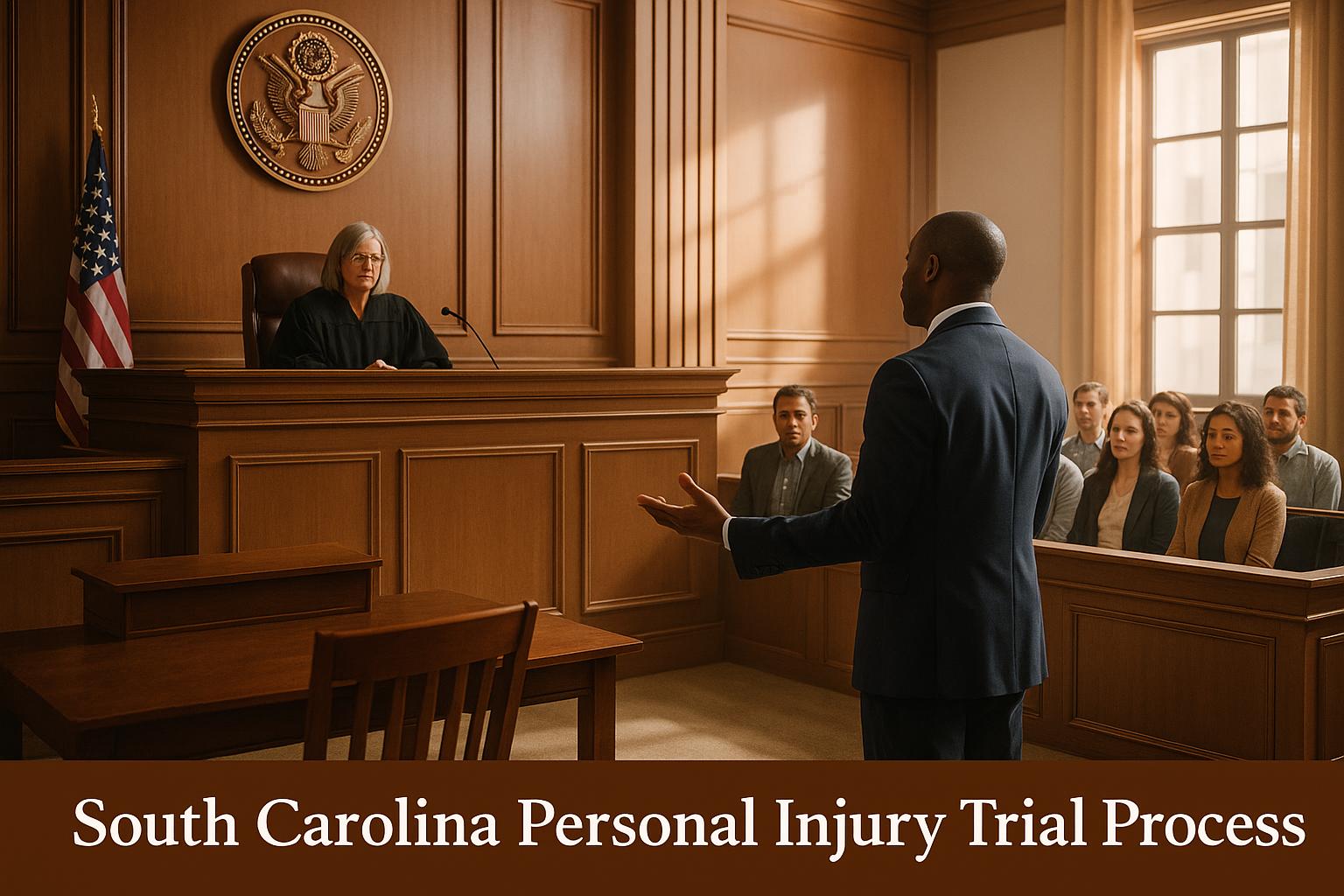South Carolina Personal Injury Trial Process
Story by Joel Berly
July 23, 2025

If you’ve been injured in South Carolina, understanding the personal injury trial process is crucial for protecting your rights and seeking compensation. Here’s the key information you need to know:
- Most cases settle: Around 95–96% of personal injury cases are resolved through settlements, with only 4–5% going to trial.
- Modified comparative negligence: In South Carolina, you can recover damages even if partially at fault, as long as your share of fault is 50% or less.
- Statute of limitations: You have 3 years from the date of injury to file a claim.
- Stages of the process: The trial process includes investigation, filing a lawsuit, discovery, mediation, and trial if necessary.
- Compensation depends on injury severity: Settlements can range from $10,000 for minor injuries to millions for catastrophic injuries or wrongful death.
While settlements are faster and less costly, trials may lead to higher compensation but involve more time and uncertainty. Consulting an experienced attorney early is key to navigating deadlines, evidence collection, and negotiations effectively.
Personal Injury Trial Stages in South Carolina
Navigating a personal injury trial in South Carolina involves several key phases, each designed to build and present your case effectively. Knowing these stages can help you feel more prepared as you work with your legal team.
Pre-Litigation: Investigation and Case Preparation
Before a lawsuit is even filed, the groundwork is laid through a thorough investigation. This step is all about gathering the evidence needed to support your claim and evaluating its strength.
Your attorney will collect crucial items like police reports, medical records, accident photos, witness statements, and any available video footage. Medical documentation is especially important because it connects your injuries directly to the accident. This is why seeking medical attention immediately – even for injuries that seem minor at first – is so critical.
At Berly Rouse Attorneys, the team examines the details of your case to determine its merits and estimate potential compensation. This often involves reviewing insurance coverage, investigating the defendant’s financial situation, and consulting with specialists such as medical experts or accident reconstruction professionals. Your legal team will also calculate the full range of your damages, which can include current and future medical costs, lost income, pain and suffering, and any long-term effects like disability or disfigurement.
Once your case is prepared, the next step is filing the lawsuit.
Filing Your Lawsuit
If settlement discussions don’t lead to an agreement, the legal process begins with filing a lawsuit. This involves submitting a summons and complaint to a South Carolina court. The complaint outlines the facts of the case, the legal grounds for your claim, and the damages you’re seeking. After filing, the defendant must be served with these documents to notify them of the lawsuit.
Timing is crucial. South Carolina law imposes a three-year statute of limitations for filing personal injury claims, starting from the date you discovered the harm caused by the accident. Missing this deadline can mean losing your chance to seek compensation. Once the defendant is served, they’ll respond to your complaint, and the case moves into the next phase: discovery.
Discovery Phase and Pre-Trial Motions
The discovery phase is where both sides exchange evidence, ensuring that neither party is caught off guard during trial. This stage can take months or even years to complete and often includes:
- Interrogatories: Written questions that must be answered under oath (South Carolina allows up to 57 questions).
- Document Requests: Sharing relevant documents, such as medical bills, insurance policies, and proof of lost wages.
- Depositions: Witnesses provide sworn testimony, which is recorded by a court reporter.
During this time, pre-trial motions may also be filed to address legal issues before the trial begins. These motions might seek to exclude certain evidence, compel the other side to provide information, or even request a summary judgment to resolve the case without a trial. Additionally, South Carolina requires mediation for personal injury cases, offering a chance to settle disputes before heading to court.
Trial Proceedings
If mediation and settlement negotiations don’t resolve the case, it proceeds to trial. Interestingly, fewer than 10% of personal injury cases actually make it to trial, highlighting the importance of diligent preparation and negotiation early on.
The trial begins with jury selection. Once the jury is chosen, both sides present opening statements. The plaintiff goes first, sharing their evidence and calling witnesses, including medical professionals and other experts. Witnesses are then cross-examined by the defense.
After the plaintiff rests their case, the defense can file motions to dismiss or proceed with presenting their own evidence and witnesses. The defense often focuses on disputing liability, questioning the severity of the plaintiff’s injuries, or arguing that other factors contributed to the damages. Once both sides have presented their cases, closing arguments are made, and the judge provides the jury with instructions on the law, including South Carolina’s modified comparative negligence rule.
The jury then deliberates privately and returns a verdict, determining both liability and the amount of compensation. In South Carolina, personal injury cases typically take about a year from the time of filing to reach trial. However, delays – often due to insurance company tactics – can stretch this timeline to 18–24 months.
What to Expect During Your Trial
Understanding the trial process can help ease your worries and give you a clearer picture of the timeline, steps involved, and possible outcomes.
Trial Timelines and Key Factors
The time it takes for your case to reach trial depends on several factors, especially in South Carolina. For simpler cases, like car accidents with clear fault, the process tends to move faster. However, more complex cases requiring expert testimony or detailed evidence can take longer. Typically, trials in South Carolina begin about a year after filing, but delays caused by insurance company tactics can stretch this to 18–24 months.
Court scheduling is another major factor. South Carolina courts handle a heavy volume of cases, which means your trial date often hinges on the court’s availability, not just your readiness. Cases involving severe or permanent injuries may also require additional time to gather detailed medical records and expert testimony. Other elements, like witness availability, pre-trial motions, and the application of South Carolina’s Modified Comparative Negligence Rule, can further impact the timeline.
These factors not only affect the duration but also influence the possible outcomes of your case.
Possible Outcomes and Appeals
When your case goes to trial, the result will fall into one of two categories. Interestingly, over 90% of personal injury cases in South Carolina settle before reaching trial. However, if your case proceeds to court, here’s what could happen:
- Plaintiff Verdict: If the jury sides with you, they will award damages. The amount varies widely depending on the specifics of your case. Recent data shows settlements in South Carolina ranging from $24,000 to $55,100, with one law firm reporting an average settlement of $55,056.08 between 2021 and 2024. Compensation also depends on the type of injury:
| Injury Type |
Settlement Range |
| Minor Injuries |
$10,000 – $50,000 |
| Moderate to Severe |
$25,000 – $100,000 |
| Catastrophic Injuries |
$50,000 – $5,000,000+ |
| Whiplash |
$12,000 – $30,000 |
| Back Injury |
$20,000 – $50,000 |
| Loss of Limb |
$750,000 – $5,000,000+ |
| Wrongful Death |
$490,000 – Several Million |
For instance, in March 2025, a South Carolina jury awarded $16 million in a case involving the death of an infant due to delays in performing an emergency C-section.
- Defendant Verdict: If the jury finds the defendant not liable, you won’t receive compensation. However, you can appeal the decision. Keep in mind that appeals focus on legal errors made during the trial, not on re-examining the facts of your case.
Tips to Prepare as a Plaintiff
Since outcomes can vary, preparing thoroughly is crucial to strengthen your case and avoid delays. Start by documenting everything – take photos of the accident, keep records of medical treatments, and track any lost income.
Follow your medical treatment plan without interruptions. Skipping treatments or ignoring your doctor’s advice can give the defense an opportunity to downplay your injuries. Also, be prompt in providing any requested documents to keep the process moving smoothly.
Expect the trial process to take anywhere from one to three years. Patience is essential as your legal team gathers evidence and builds your case.
Partnering with experienced personal injury attorneys, like those at Berly Rouse Attorneys, can make a big difference. Their deep understanding of South Carolina law, strong connections with local medical experts, and familiarity with the court system can help you navigate the legal and emotional challenges of a trial while ensuring your rights are protected.
sbb-itb-7016c6e
Settlement vs. Trial: Which Option is Right for You
Deciding between a settlement or going to trial is a key choice in any personal injury case. While most cases settle before reaching the courtroom, the best path for you depends on factors like your financial situation, recovery timeline, and the strength of your evidence.
Settlements often provide a quicker and more predictable resolution. On the other hand, trials may offer the opportunity for higher compensation or public accountability for the defendant’s actions. Weighing factors like timing, stress, and long-term goals with your attorney is essential. Below, we break down the pros and cons of each option to help you make an informed decision.
Settlement Benefits and Drawbacks
A settlement involves reaching an agreement with the other party before heading to court. It has its advantages but also comes with certain trade-offs.
| Settlement Benefits |
Settlement Drawbacks |
| Faster Resolution: Simple cases often settle within 6–9 months |
Lower Compensation: Settlement amounts may be less than a jury award |
| Predictable Outcome: You know the exact amount you’ll receive |
No Admission of Fault: The at-fault party typically avoids admitting responsibility |
| Lower Costs: Fewer legal fees and court expenses |
Finality: Once settled, you can’t pursue additional compensation |
| Reduced Stress: Avoids the emotional strain of a trial |
Pressure to Settle: You may feel pushed to accept a low offer |
| Privacy: Settlement terms remain confidential |
Limited Accountability: The defendant’s actions stay out of the public eye |
| Greater Control: You help shape the final agreement |
Insurance Tactics: Insurers often start with lowball offers |
Trial Benefits and Drawbacks
Opting for a trial means presenting your case to a judge or jury, who will decide the outcome. This route has distinct advantages but also involves greater challenges.
| Trial Benefits |
Trial Drawbacks |
| Higher Compensation Potential: Juries may award more than initial settlement offers |
Unpredictable Outcome: There’s a risk of receiving little or no compensation if you lose |
| Public Accountability: The defendant’s actions are documented in the public record |
Lengthy Process: Trials can take years to conclude |
| Full Case Presentation: You can present all evidence and testimony |
Higher Costs: Legal fees and court expenses increase significantly in trials |
| Precedent Setting: A favorable verdict could influence future cases |
Emotional Toll: Litigation can be draining and stressful |
| Justice and Closure: A verdict may provide personal satisfaction |
Appeals: An unfavorable decision could lead to prolonged legal battles |
| Expert Testimony: Complex evidence can be thoroughly explained |
Public Record: All case details become accessible to the public |
Trials are often more expensive and uncertain, both financially and emotionally. Most personal injury attorneys work on a contingency fee basis, typically taking 33% to 40% of the final settlement. As The Tourigny Law Firm LLC explains:
Settling a case often results in a quicker resolution with less risk, while going to trial can lead to a larger settlement but involves more uncertainty and expense.
When choosing between a settlement and a trial, think about your recovery progress, the impact of your injury on your work, and how strong your evidence is. If you need immediate funds for mounting medical bills or lost income, a settlement might be the better option. However, if your case is strong and settlement offers don’t adequately cover your damages, pursuing a trial could be worth the time and effort.
Conclusion
Navigating South Carolina’s personal injury trial process – from the initial investigation to a possible appeal – can feel overwhelming. But understanding how it works is key to protecting your rights and maximizing any compensation you may be entitled to. With South Carolina experiencing a 217% higher rate of personal injury cases compared to the national average, having experienced legal support is more than just helpful – it’s essential.
While only about 4–5% of personal injury cases actually make it to trial, most are resolved through settlements. Whether your case is settled early or moves through the stages of discovery and trial, every step requires careful legal navigation to ensure the best possible outcome.
South Carolina follows a modified comparative negligence rule, meaning your compensation is reduced by the percentage of fault assigned to you. If you’re found more than 50% responsible, you won’t be eligible to recover damages. This makes it critical to build a strong case from the start, as even small details can significantly affect the result.
Timing is also crucial. South Carolina enforces a three-year statute of limitations for personal injury claims. Acting quickly by seeking medical attention, gathering evidence, and consulting with an attorney can be the difference between a successful claim and losing your chance to recover damages.
At Berly Rouse Attorneys, we know how complicated South Carolina’s personal injury process can be. Based in Charleston, our team specializes in personal injury cases and works on a contingency fee basis – so you don’t pay unless we win your case. From the initial evaluation to trial proceedings, we’ll handle every detail, giving you the space to focus on healing while we fight for the compensation you deserve.
If you’ve been injured, don’t wait. Contact Berly Rouse Attorneys today for a free consultation to protect your rights and pursue the fair compensation you’re entitled to.
FAQs
Should I settle my personal injury case or take it to trial in South Carolina?
Deciding whether to settle or take your case to trial involves weighing several key factors, such as potential compensation, time, and costs. Settling often provides a faster resolution, reduces expenses, and minimizes stress. However, it may also mean agreeing to a smaller payout than what you might achieve in court. On the flip side, going to trial could lead to a larger award and a stronger sense of justice, but it comes with higher risks, longer timelines, and increased costs.
If you’re in South Carolina, keep in mind that you typically have three years from the date of your injury to file a lawsuit. This makes timing a critical factor. Speaking with an experienced attorney can help you carefully evaluate your situation and decide on the best course of action for your specific needs.
How does South Carolina’s modified comparative negligence rule impact a personal injury case?
South Carolina uses a modified comparative negligence rule to determine how damages are awarded in personal injury cases. Under this rule, your ability to receive compensation depends on your share of fault in the incident. If you’re found to be 51% or more at fault, you won’t be eligible for any compensation. However, if you’re 50% or less at fault, you can still recover damages, though the amount will be reduced based on your percentage of fault.
Here’s how it works: Say you’re awarded $100,000 in damages but are found 20% at fault. In this case, your compensation would be reduced by $20,000, leaving you with $80,000. This highlights why establishing the other party’s liability is so critical in personal injury claims.
What challenges and delays should I expect during the discovery phase of a personal injury trial in South Carolina?
The discovery phase of a personal injury trial in South Carolina often comes with its fair share of hurdles. Challenges can include collecting a large amount of evidence, waiting for medical or official records to be released, and scheduling depositions with several involved parties. In more intricate cases, these tasks can take up a significant amount of time.
Typically, the discovery phase lasts several months, but in some instances, it can stretch beyond a year. The timeline often depends on how complicated the case is and the court’s availability. During this period, staying patient and focusing on thorough preparation is key to building a strong case.
Related posts
Categories: Uncategorized



